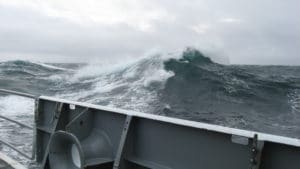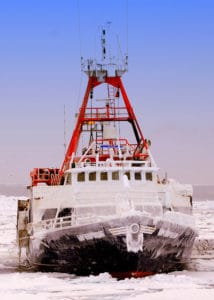In December 2018 the North Pacific Council adopted a Bering Sea Fishery Ecosystem Plan (BS FEP). Fisheries Ecosystem Plans are a tool that can serve as a framework for continued incorporation of ecosystem goals and actions in regional management.
The Bering Sea FEP is a living document that will be updated over time and used to guide policy options and associated opportunities, risks, and tradeoffs affecting FMP species and the broader Bering Sea ecosystem in a systematic manner. The adopted “Core” document for the Bering Sea FEP documents current procedures and best practices for ecosystem-based fishery management (EBFM), provides brief, targeted, and evolving descriptions of the interconnected physical, biological, and human/institutional Bering Sea ecosystem and through ecosystem thresholds and targets, and directs how that information can be used to guide fishery management options.
The Council underscored its commitment to EBFM with the adoption of an ecosystem approach policy statement in 2014. With the development of a Bering Sea FEP, the Council has progressed on the continuum of EBFM, allowing Alaska to lead internationally in fishery management, and provide a clear record of the Council’s ecosystem-based policy decision making, while still applying policies that are suited to Alaskan circumstances. In 2007, the Council developed an FEP for the Aleutian Islands, which describes ecosystem processes, and physical, biological, socioeconomic, and management interactions in the area, and includes a qualitative ecosystem risk assessment and description of how risk associated with these interactions is currently being addressed by managers.
The Council’s interest was to develop an FEP that:
- provides added value to existing Council documents, processes, and decision-making;
- delivers targeted, evolving ecosystem evaluations but does not overwhelm the audience with a compilation of ecosystem information; and
- results in measurable improvements to Bering Sea fishery management, but does not directly authorize management actions (action-informing rather than action-forcing).
Staff contact is Diana Evans.
BS FEP Action Modules
To date, the Council has initiated two Action Modules under the framework of the Bering Sea, and task forces have been created to accomplish their tasks over the course of 2-3 years.
Evaluating Climate Change Action Module Taskforce
The goal of this climate project is to evaluate the vulnerability of key species and fisheries to climate change, and to strengthen resilience in regional fisheries management.
Local Knowledge/Traditional Knowledge/Subsistence Action Module Taskforce
The goal of the Local Knowledge (LK), Traditional Knowledge (TK) and Subsistence Action Module is to develop protocols for using LK and TK in management, and to understand the impacts of Council decisions on subsistence resources, users, and practices.

Bering Sea Fishery Ecosystem Plan Team
The Council has appointed the following members of a Bering Sea Fishery Ecosystem Plan Team (BS FEP) team. The Team’s primary responsibilities are to develop and update the Core FEP document, to discuss potential and ongoing FEP action modules, make recommendations to the Ecosystem Committee and the Council about future steps, and to help communicate results to the Council.
Team Members
- Kerim Aydin
- Mike Dalton
- Ben Daly
- Anne Marie Eich
- Diana Evans
- Brad Harris
- Davin Holen
- Jim Ianelli
- Jo-Ann Mellish
- Heather Renner
- Elizabeth (Ebett) Siddon
- Phyllis Stabeno
- Ian Stewart
- Stephani Zador
FEP team terms of reference
- Strategic guidance for monitoring Bering Sea ecosystem status
- Develop and keep current an appropriate suite of ecosystem indicators specific to the BS FEP’s Ecosystem Objectives, to be tracked in the annual Ecosystem Status Report. Note, collaboration may be required for developing appropriate social science indicators.
- Review ecosystem status through recent ESRs and other ecosystem information, report on indicator status for success metrics.
- Provide a strategic review of ecosystem products, red flags, discussion points from the previous fall cycle, particularly with respect to the BS FEP’s Ecosystem Objectives. Coordinate with the ongoing AFSC effort to discuss ecological processes in the spring.
- BS FEP Action Modules
- Provide recommendations on new Action Modules, prepare candidate proposals for ideas for Council consideration (six questions).
- Track progress of ongoing Action Modules, review work plans and recommend staffing, ensure that results are reported to the Council in a way that fosters their use in the management process. Provide appropriate reporting and, if appropriate, recommendations, to the Council and other Council advisory bodies (SSC, Advisory Panel, Ecosystem Committee, others).
- Maintain the Core BS FEP
- Consider how completed Action Modules inform the Core BS FEP, update as appropriate with new information and Action Module results.
- Consider developing a BS FEP summary of how ecosystem information was used in the specifications process or other Council actions each year.
- Track how information developed as a result of the Council’s BS FEP is used in the Council process.
- Outreach and communication
- Recommend outreach and communication products in support of the BS FEP.
- Provide the Council with periodic overviews of AFSC ecosystem products and research, including progress with use and review of local knowledge (LK) and traditional knowledge (TK) within and alongside natural and social science in the fisheries management process.
- Work collaboratively with other Council Plan Teams.
FEP Team Meetings
- BS FEP team meeting: September 5-7, 2017. AFSC, Seattle, WA
- BS FEP team meeting: April 24-26, 2017. Homer, AK.
- Agenda
- Presentations from the Bering Sea and Aleutian Islands Landscape Conservation Cooperative: overview, coastal resiliency workshops
- BS FEP team meeting: January 19-20, 2017, Seattle, WA.
- REPORT
- Agenda, background documents:
- Comparison of FEP contents
- Council discussion paper on BS Fishery Ecosystem Plan (12/15)
- Lenfest report on Building Effective Fishery Ecosystem Plans (Executive Summary, report, website)
- NMFS Ecosystem-Based Fishery Management Policy and Roadmap (website)
2016
- December – Council approves membership of BS FEP team
- January – update on next steps for Ecosystem Committee
2014
- October – Council motion
- September – Staff synthesis, Ecosystem Committee minutes
- June-October – the Council requested public input from local residents and communities, as well as agencies, organizations and the general public, about the objectives and structure of the FEP, prior to decision-making. The following are summaries of stakeholder input at three public hearings: Nome, AK – June 2014
- Seattle, WA – September 15, 2014
- Anchorage, AK – October 9, 2014
- February – Discussion paper, Ecosystem Committee minutes, Council motion
2013
- June – Council motion initiating work on BS FEP






